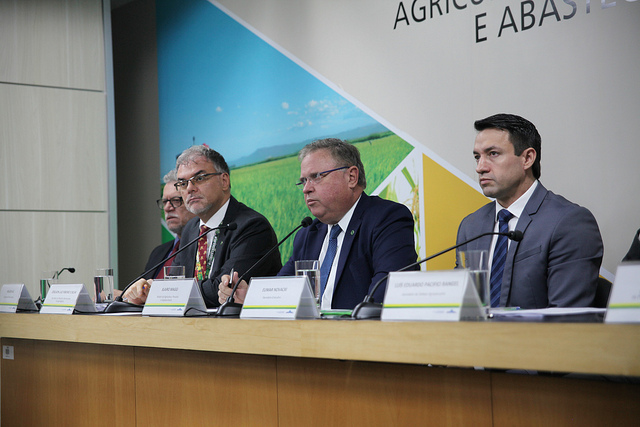São Paulo – Minister of Agriculture, Livestock, and Supply Blairo Maggi (on the photo, 2nd person from right to left) highlighted the importance of relations with Arab countries and China and said he recommended to the future minister Tereza Cristina that she travels to those markets at the very beginning of the new government in order to maintain a good relationship and a commercial position. The speech took place during an event for the assessment of his term as minister this Friday (14) in Brasília.
‘I’ve met with Tereza and didn’t ask for anything, just made an observation about the international market issue, which we worked so hard for and successfully opened new markets. I said that this work must continue, not only to open new market but also to keep those we already have,’ said the Minister. The new government start in January 1st, 2019.
He also highlighted the importance to mantain a good relationship with the Chinese and Arab markets, making frequent visits. ‘I’ve visited China six times during the time I am here; going to China, talking to other ministers and Chinese businesses is very important. Chinese, Arabs, they really like when you are there, talking eye to eye, in order to convey to them that our country wants to have them as partners, that we are reliable partners; we don´t scramble for world hegemony in economics, politics, territories,’ he emphasized, still commenting on his discussion with the future minister.
Last year, for example, Maggi was in Kuwait, Saudi Arabia, United Arab Emirates, and Qatar, along with a business delegation. The mission had the support from the Arab Brazilian Chamber of Commerce and the participation of its president Rubens Hannun. Previously in 2016, the Minister was in Morocco for the COP 22, the UN conference about climate held in Marrakesh.
The Minister also received delegations from Arab countries in Brazil and went back to the UAE this year in order to attend a fair of agriculture investments. During the launch of ANBA’s new website in March 2018, Maggi gave an exclusive interview to the agency highlighting the importance of Arab markets. Other authorities from the Ministry also leaded missions to the region and the Ministry organized the participation of Brazilian businesses in the last two editions of the food industry fair SIAL Middle East in Abu Dhabi.
Maggi says, ‘Brazil is a country that should follow its path, its pace, becoming the biggest agriculture and livestock producer of the world, selling our products and providing quality and frequent delivery of these goods.’
The Minister said Tereza Cristina will continue the work being done for the last years but may face challenges because of the added task such as land matters and family agriculture, which will be incorporated to the Ministry, and the reintroduction of the Department of Fishing to the Ministry, which ‘will demand a lot of energy from her,’ he said.
Maggi also talked about the importance of maintaining the Ministry’s name and said he will congratulate the elected President Jair Bolsonaro ‘if he really is against the change of the current Ministry’s name.’ He affirms the change may implicate high expenses, since certificates and industry packages would have to be changed. ‘Besides, even the Chinese who don’t speak Portuguese refer to us as MAPA (Ministry of Agriculture, Livestock, and Supply). That’s how they treat the ministry,’ he stressed.
The minister said that in his two years and seven months on the job, 78 new products were introduced into the export agenda to 30 country. The Minister also informed that the prediction is that 2018 will end with a new export record in agribusiness, going beyond USD 100 billion. The current record is USD 99,9 billion, from 2003.
According to him, 1,070 actions were made within the program Agro+ through norms that helped to cut back the bureaucracy of the sector, with the participation of 153 entities representing agribusiness. In the area of Agriculture and Livestock Defense, there were 400 new agrochemicals, increasing the options of products for agriculture use.
Translated by Guilherme Miranda




